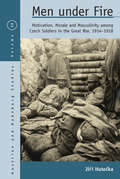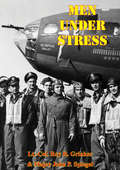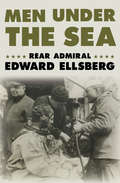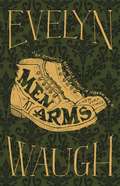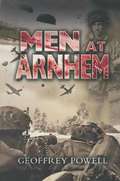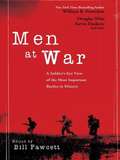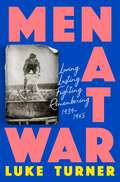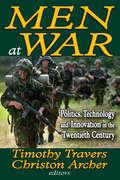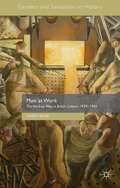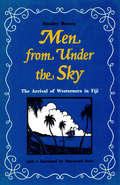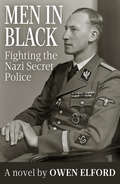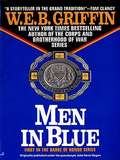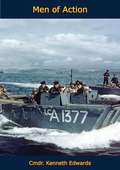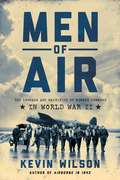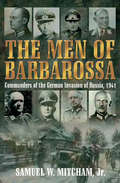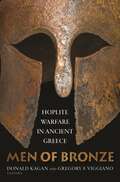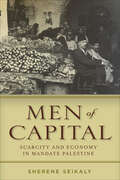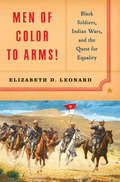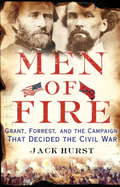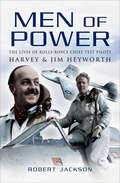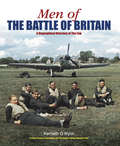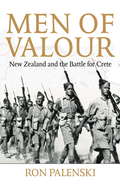- Table View
- List View
Men Under Fire: Motivation, Morale, and Masculinity among Czech Soldiers in the Great War, 1914–1918 (Austrian and Habsburg Studies #26)
by Jiří HutečkaIn historical writing on World War I, Czech-speaking soldiers serving in the Austro-Hungarian military are typically studied as Czechs, rarely as soldiers, and never as men. As a result, the question of these soldiers’ imperial loyalties has dominated the historical literature to the exclusion of any debate on their identities and experiences. Men under Fire provides a groundbreaking analysis of this oft-overlooked cohort, drawing on a wealth of soldiers’ private writings to explore experiences of exhaustion, sex, loyalty, authority, and combat itself. It combines methods from history, gender studies, and military science to reveal the extent to which the Great War challenged these men’s senses of masculinity, and to which the resulting dynamics influenced their attitudes and loyalties.
Men Under Stress
by Lt.-Col. Roy R. Grinker Major John P. SpiegelThe stress of war tries men as no other test that they have encountered in civilized life. Like a crucial experiment it exposes the underlying physiological and psychological mechanisms of the human being. Exceedingly valuable lessons can be learned from it regarding the methods by which men adapt themselves to all forms of stress, either in war or in peace. Under sufficient stress any individual may show failure of adaptation, evidenced by neurotic symptoms. Such symptoms then are pathological only in a comparative sense, when contrasted with the symptoms of those still making successful adaptations.While the material in this book concerns flying personnel almost exclusively, the psychological mechanisms under discussion in this book are those that apply to Everyman in his struggle to master his own environment. In this realm, a hair divides the normal from the neurotic, the adaptive from the non-adaptive. The failures of adaptation of the soldier described herein mirror Everyman’s everyday failures or neurotic compromises with reality.The book’s material is roughly divided into a discussion of war neuroses appearing overseas and those in combat veterans returned home for relief from flying or for rehabilitation. “Men under Stress” covers a vast array of topics, beginning with the background and selection of flight personnel, followed by seventeen chapters on the combat environment and reactions to it—which include the subjects of morale, combat stress, psychodynamics, emotional disorders and neurotic reactions, guilt and depression, aggression and hostility, psychosomatic states; psychotic-like states, and the treatment modalities of psychotherapy, narcosynthesis, and adjunctive treatment. The book closes with two chapters on civilian applications, including civilian psychiatry and general social implications.
Men Under the Sea
by Rear Admiral Edward Ellsberg&“Ellsberg&’s writings chronicled his experiences and attitudes on the topic of marine salvage in a manner which has no equal in naval literature.&” —War History Online Commander Edward Ellsberg rose to fame after leading the harrowing effort to raise the sunken submarine S-51 just off Long Island. That is where he begins Men Under the Sea, his tribute to and history of the men who risk everything to plunge into the blackness of the deep sea. Ellsberg holds an expert&’s knowledge of deep-sea salvage, and that knowledge has put him repeatedly on the front lines of some of the world&’s worst wrecks. After the S-51, Ellsberg goes on to the heartrending tale of the sinking of the submarine S-4, which sank after a collision with forty sailors aboard. Commander Ellsberg races to the scene through land, air, and sea to search for potential survivors trapped aboard the sunken sub. Ellsberg also regales readers with stories of some of the most famous underwater missions in history, such as men submerging deep to recover £5 million worth of gold from the wreck of the Laurentic, bringing vast treasures from the ocean bottom, and diving to rescue thirty-three survivors from the stricken submarine Squalus. Ellsberg&’s passion, experience, and natural narrative talent turn Men Under the Sea into an unforgettable voyage.
Men at Arms (Sword of Honour Trilogy #1)
by Evelyn WaughThe first volume of Evelyn Waugh's masterful trilogy about war, religion, and politics. The next two books are Officers and Gentlemen, and The End of the Battle.
Men at Arnhem
by Geoffrey PowellWhen Men at Arnhem was first published in 1976 the author modestly concealed his identity behind a pseudonym and changed the names of his comrades in arms. But the book was at once recognised as one of the finest evocations of an infantrymans war ever written and those in the know were quick to identify the author. His cover has long since been blown, in this edition Geoffrey Powell adds an introduction in which he identifies the men who fought with him in those eight terrible days at Arnhem in September, 1944. The book cannot be said to be a military history in the strictest sense, even the units involved being unidentified, but the events described are, as the author points out in his introduction, as nearly accurate as memory allowed after a lapse of over thirty years. It is unlikely every to be surpassed as the most vivid first-hand account of one of those epic disasters which we British, in our paradoxical way, seem to cherish above and beyond the most glorious victories.
Men at War
by Bill FawcettEpic battles?as seen through the eyes of the men who fought them. From Gettysburg to D-Day, history?s most momentous battles have been recounted to the world on a grand scale. This book, for the first time ever, looks at man?s most epic battles from the point of view of the soldiers on the front lines; providing new insight into the great wars of history. Stories told by the Roman Legionaire, the British Doughboy, and the American Doggie, delve into these battles and battlefronts: Roman Legion Third Crusade under Richard Lionheart Waterloo, French under Napoleon American Civil War: Gettysburg WWI: Americans at Ardennes WWII: Japanese Island Defense WWII: D-Day, Americans at Normandy Marines at Chosin.
Men at War: Loving, Lusting, Fighting, Remembering 1939-1945
by Luke TurnerAs a child, Luke Turner was obsessed with the Second World War. He spent hours watching Sunday war films, poring over stories of derring-do and relishing in birthday trips to air museums. Lying in bed beneath Airfix fighter planes suspended from his ceiling, he would think about the men that might sit in their cockpits, and whether he could ever be one of them. Now, as an adult who has come to terms with a masculine identity and sexuality that is often erased from dominant military narratives, he undertakes a refreshingly honest analysis of his fascination with the war. In Men at War, Turner looks beyond the increasingly retrogressive and jingoistic ideal of a Britain that never was to recognise men of war as creatures of love, fear, hope and desire. From writers, filmmakers, artists and ordinary men - including those in his own family - Turner assembles a broad cast of characters to bring the war to life. There are conscientious objectors, a bisexual Commando, a pacifist poet who flew for Bomber Command, a transgender RAF pilot, a soldier who suffered in Japanese POW camps and later in life became an LGBT+ activist, and those who simply did what they could just to survive and return home to a complicated peace. As the conflict moves beyond living memory and the last veterans leave us, we are in danger of missing the opportunity to gain a true understanding of this rich history. By exploring a wartime experience that embraces sex, lust and the body as much as tactics and weaponry, Turner argues that the only way we can really understand the Second World War is to get to grips with the complexity of the lives and identities of those who fought and endured it.
Men at War: Loving, Lusting, Fighting, Remembering 1939-1945
by Luke TurnerAs a child, Luke Turner was obsessed with the Second World War. He spent hours watching Sunday war films, poring over stories of derring-do and relishing in birthday trips to air museums. Lying in bed beneath Airfix fighter planes suspended from his ceiling, he would think about the men that might sit in their cockpits, and whether he could ever be one of them. Now, as an adult who has come to terms with a masculine identity and sexuality that is often erased from dominant military narratives, he undertakes a refreshingly honest analysis of his fascination with the war. In Men at War, Turner looks beyond the increasingly retrogressive and jingoistic ideal of a Britain that never was to recognise men of war as creatures of love, fear, hope and desire. From writers, filmmakers, artists and ordinary men - including those in his own family - Turner assembles a broad cast of characters to bring the war to life. There are conscientious objectors, a bisexual Commando, a pacifist poet who flew for Bomber Command, a transgender RAF pilot, a soldier who suffered in Japanese POW camps and later in life became an LGBT+ activist, and those who simply did what they could just to survive and return home to a complicated peace. As the conflict moves beyond living memory and the last veterans leave us, we are in danger of missing the opportunity to gain a true understanding of this rich history. By exploring a wartime experience that embraces sex, lust and the body as much as tactics and weaponry, Turner argues that the only way we can really understand the Second World War is to get to grips with the complexity of the lives and identities of those who fought and endured it.
Men at War: Politics, Technology, and Innovation in the Twentieth Century
by Christon ArcherThe growing number of books on military history and the lively interest in military history courses at colleges and universities show that the study of war is enjoying considerable popularity. The reasons for this are arguable, but of immediate interest is the kind of military history that is taught and written. Here the student of war comes across an interesting division of opinion as to how military history should be written. Military history, lying as it does on the frontier between history and military science, requires knowledge of both fields. This fact often presents a difficulty to the history teacher.Generally speaking, history is a discipline by virtue of its subject matter, not by virtue of a particular methodology such as is characteristic of the sciences and of some social sciences. The perspective of Men at War is a cross between a professional internalist approach and a civilian contextual view. This separation is not unique to military history, for the same dualism tends to occur in those areas of history, such as law and medicine, that can be written both by members of the profession concerned lawyers and doctors and by those outside the profession.The problem is that at one extreme the contextual view can take the emotional content out of war, while at the other extreme the internalist view can put too much in. Men at War seeks to locate a military history that combines the professional, internalist method and the civilian, contextual method by showing that these are two fundamental sources from which a war derives. Seen in this way, this volume breaks new ground in defining the sources of twentieth-century power.
Men at Work: The Working Man in British Culture, 1939-1945 (Genders and Sexualities in History)
by Linsey RobbMen at Work explores the cultural portrayal of four essential wartime occupations: agriculture, industry, firefighting and the mercantile marine. In analysing a broad spectrum of wartime media (most notably film, radio and visual culture) it establishes a clear hierarchy of masculine roles in British culture during the Second World War.
Men from Under the Sky
by Stanley Brown Raymond BurrThe cannibal kings of Fiji are gone, but their spirit lives on. Cannibalism in Fiji and the gruesome "earth ovens" are gone; the kai vavalagi, "the men from over the horizon," changed that, bringing their own brands of justice tempered by the musket, disease, and dissoluteness.There were giants in those days, Fijians and Westerners alike. This gripping and unique history of Fiji by Stanley Brown, a well-known Fiji "old-timer" and historian, is woven around the lives of eleven Western "giants," Europeans and Americans who had the greatest impact on each epoch. Not all these Westerners lived to tell the tale.This stirring narrative is replete with hair-raising accounts of battles and brutality. One incident of supreme savagery was reported by Lockerby, a famous trader, who reported that more than three hundred fifty old men, women and children were butchered after a battle: "As the canoes sallied back tot he mainland coast in the evening, the reddening sky silhouetted the bodies of children hanging from the mastheads." The earth-ovens were well-fueled that evening. But time and the tides of civilization tame the savage beast, and today Fiji is busy developing its economy, but the old accounts and stories still ring true.
Men from Under the Sky
by Stanley Brown Raymond BurrThe cannibal kings of Fiji are gone, but their spirit lives on. Cannibalism in Fiji and the gruesome "earth ovens" are gone; the kai vavalagi, "the men from over the horizon," changed that, bringing their own brands of justice tempered by the musket, disease, and dissoluteness.There were giants in those days, Fijians and Westerners alike. This gripping and unique history of Fiji by Stanley Brown, a well-known Fiji "old-timer" and historian, is woven around the lives of eleven Western "giants," Europeans and Americans who had the greatest impact on each epoch. Not all these Westerners lived to tell the tale.This stirring narrative is replete with hair-raising accounts of battles and brutality. One incident of supreme savagery was reported by Lockerby, a famous trader, who reported that more than three hundred fifty old men, women and children were butchered after a battle: "As the canoes sallied back tot he mainland coast in the evening, the reddening sky silhouetted the bodies of children hanging from the mastheads." The earth-ovens were well-fueled that evening. But time and the tides of civilization tame the savage beast, and today Fiji is busy developing its economy, but the old accounts and stories still ring true.
Men in Arms: A History of Warfare and Its Interrelationships with Western Society
by Sydney F. Wise Richard A. PrestonTextbook in military history traces the development of warfare and relates it to the development of Western society. This edition (fourth, 1979) revises previous editions and updates the text to 1990.
Men in Black: Fighting the Nazi Secret Police
by Owen ElfordMen in Black, first published in 1942, is a novel of Czech resistance to the occupying Germans in the early days of World War Two, and the struggle against the Gestapo, or Nazi secret police. The culminating act of the resistance is the assassination of Reinhard Heydrich, head of the Gestapo, which would lead to massive reprisals, including the razing of the village of Lidice and the execution of many of its inhabitants (the original subtitle of the book was “A Novel about Lidice,” but the book does not detail the massacre that occurred there). Men in Black is a moving, albeit fictional, account of the courage and sacrifice made by men and women during the war, and the brutality the Nazis imposed on those who dared to resist.
Men in Blue
by W.E.B. GriffinW. E. B. Griffin's bestselling series, THE CORPS and BROTHERHOOD OF WAR, have captured the pride and glory of the military community. Now he reveals a city police force with the same unique blend of realism, drama, and action. Here are the brave men and women behind the badge as you've never seen them before--their hopes and fears, their courage and heroism, sparked by a single, shocking event: the killing of a cop in the line of duty. .
Men of Action
by Cmdr. Kenneth EdwardsOriginally published in 1943, this is a unique collection of accounts relating to 19 distinguished Royal Navy Admirals and Captains of the Second World War Royal Navy.Written in the midst of World War II by Royal Navy Commander Kenneth Edwards, each contemporary portrait is filled with fascinating details. From the grey ships accompanying the convoys in the Atlantic to the seaborne Royal Navy Marines the struggle at sea during the Second World War is brought to life.An essential book for all R.N. historians to add to their collection!
Men of Air: The Courage And Sacrifice Of Bomber Command In World War Ii
by Kevin WilsonThe story of the everyday heroism of bomber crews in 1944, a turning point in the war against Germany. Bomber combat crews faced a wide array of perils as they flew over German territory. Bursts of heavy flak could tear the wings from their planes in a split second. Flaming bullets from German fighter planes could explode their fuel tanks, cut their oxygen supplies, destroy their engines. Thousands of young men were shot, blown up, or thrown from their planes five miles above the earth; and even those who returned faced the subtler dangers of ice and fog as they tried to land their battered aircraft back home. The winter of 1944 was the most dangerous time to be a combat airman in RAF Bomber Command. The chances of surviving a tour were as low as one in five, and morale had finally hit rock bottom. In this comprehensive history of the air war that year, Kevin Wilson describes the most dangerous period of the Battle of Berlin, and the unparalleled losses over Magdeburg, Leipzig and Nuremberg. Men of Air reveals how these ordinary men coped with the extraordinary pressure of flying, the loss of their colleagues, and the threat of death or capture. Brilliantly placing these stories within the context of The Great Escape, D-Day, the defeat of the V1 menace, and more, Wilson shows how the sheer grit and determination of these "Men of Air" finally turned the tide against the Germans.
Men of Barbarossa: Commanders of the German Invasion of Russia, 1941
by Samuel W. Mitcham Jr.&“&‘A must read&’ for Eastern Front fans, as well as anyone seeking to find out more about the titanic struggle between Hitler and Stalin.&” —Armchair General This book not only tells the story of Operation Barbarossa, the German invasion of the Soviet Union, but describes the expertise, skills, and decision-making powers of the men who directed it, including new insights into the invasion&’s many tactical successes, as well as its ultimate failure. This objective is massive in scope, because Operation Barbarossa was massive in scale, arguably the largest military operation of all time. The campaign also changed the world forever. Before Barbarossa, Hitler&’s Wehrmacht seemed invincible, like an unstoppable force of nature. No one, it seemed, could check the Führer&’s ambitions, much less defeat him. Barbarossa changed all of that. By the end of 1941, Allied victory seemed to be a very real possibility. Few would have bet on it sixteen or seventeen months earlier. Pitting Germany in total war against the Soviet Union on a 1,000-mile front, Operation Barbarossa was truly staggering in its magnitude. Wars, however, are not fought by numbers, they are fought by men. In this book we learn of the villains and heroes, famous commanders and unsung leaders, and about those who were willing to stand up to the Führer and those who subordinated themselves to his will. The result is a book that casts a fresh perspective on one of history&’s most crucial military campaigns.
Men of Bronze: Hoplite Warfare in Ancient Greece
by Donald Kagan and Gregory F. ViggianoA major contribution to the debate over ancient Greek warfare by some of the world's leading scholarsMen of Bronze takes up one of the most important and fiercely debated subjects in ancient history and classics: how did archaic Greek hoplites fight, and what role, if any, did hoplite warfare play in shaping the Greek polis? In the nineteenth century, George Grote argued that the phalanx battle formation of the hoplite farmer citizen-soldier was the driving force behind a revolution in Greek social, political, and cultural institutions. Throughout the twentieth century scholars developed and refined this grand hoplite narrative with the help of archaeology. But over the past thirty years scholars have criticized nearly every major tenet of this orthodoxy. Indeed, the revisionists have persuaded many specialists that the evidence demands a new interpretation of the hoplite narrative and a rewriting of early Greek history. Men of Bronze gathers leading scholars to advance the current debate and bring it to a broader audience of ancient historians, classicists, archaeologists, and general readers.After explaining the historical context and significance of the hoplite question, the book assesses and pushes forward the debate over the traditional hoplite narrative and demonstrates why it is at a crucial turning point. Instead of reaching a consensus, the contributors have sharpened their differences, providing new evidence, explanations, and theories about the origin, nature, strategy, and tactics of the hoplite phalanx and its effect on Greek culture and the rise of the polis.The contributors include Paul Cartledge, Lin Foxhall, John Hale, Victor Davis Hanson, Donald Kagan, Peter Krentz, Kurt Raaflaub, Adam Schwartz, Anthony Snodgrass, Hans van Wees, and Gregory Viggiano.
Men of Capital: Scarcity and Economy in Mandate Palestine
by Sherene SeikalyMen of Capital examines British-ruled Palestine in the 1930s and 1940s through a focus on economy. In a departure from the expected histories of Palestine, this book illuminates dynamic class constructions that aimed to shape a pan-Arab utopia in terms of free trade, profit accumulation, and private property. And in so doing, it positions Palestine and Palestinians in the larger world of Arab thought and social life, moving attention away from the limiting debates of Zionist-Palestinian conflict. Reading Palestinian business periodicals, records, and correspondence, Sherene Seikaly reveals how capital accumulation was central to the conception of the ideal "social man. " Here we meet a diverse set of characters--the man of capital, the frugal wife, the law-abiding Bedouin, the unemployed youth, and the abundant farmer--in new spaces like the black market, cafes and cinemas, and the idyllic Arab home. Seikaly also traces how British colonial institutions and policies regulated wartime austerity regimes, mapping the shortages of basic goods--such as the vegetable crisis of 1940--to the broader material disparities among Palestinians and European Jews. Ultimately, she shows that the economic is as central to social management as the political, and that an exclusive focus on national claims and conflicts hides the more complex changes of social life in Palestine.
Men of Color to Arms!: Black Soldiers, Indian Wars, and the Quest for Equality
by Elizabeth D. LeonardThe story of the black soldiers who helped save the Union, conquer the West, and build the nation. In 1863, at the height of the Civil War, Frederick Douglass promised African Americans that serving in the military offered a sure path to freedom. Once a black man became a soldier, Douglass declared, "there is no power on earth or under the earth which can deny that he has earned the right to citizenship in the United States." More than 180,000 black men heeded his call to defend the Union--only to find the path to equality would not be so straightforward. In this sharply drawn history, Professor Elizabeth D. Leonard reveals the aspirations and achievements as well as the setbacks and disappointments of African American soldiers. Drawing on eye-opening firsthand accounts, she restores black soldiers to their place in the arc of American history, from the Civil War and its promise of freedom until the dawn of the 20th century and the full retrenchment of Jim Crow. Along the way, Leonard offers a nuanced account of black soldiers' involvement in the Indian Wars, their attempts to desegregate West Point and gain proper recognition for their service, and their experience of Reconstruction nationally, as blacks worked to secure their place in an ever-changing nation. With abundant primary research, enlivened by memorable characters and vivid descriptions of army life, Men of Color to Arms! is an illuminating portrait of a group of men whose contributions to American history need to be further recognized.
Men of Fire: Grant, Forrest, and the Campaign That Decided the Civil War
by Jack HurstDeep in the winter of 1862, on the border between Kentucky and Tennessee, two extraordinary military leaders faced each other in an epic clash that would transform them both and change the course of American history forever. Brigadier General Ulysses S. Grant had no significant military successes to his credit at the outset of the campaign. He was barely clinging to his position within the Union Army--he had been officially charged with chronic drunkenness only days earlier, and his own troops despised him. His opponent was as untested as he was: an obscure lieutenant colonel named Nathan Bedford Forrest. The two men held one thing in common: an unrelenting desire for victory at any cost. A riveting account of the making of two great military leaders, and two battles that transformed America forever, Men of Fire is destined to become a classic work of military history.
Men of Power: The Lives of Rolls-Royce Chief Test Pilots Harvey & Jim Heyworth
by Robert JacksonThe story begins in 1940 when Harvey Heyworth was leading No. 79 Squadron RAF defending north-eastern England from Luftwaffe raids made by bombers based in Norway and Denmark and then later in the Battle of Britain when the unit moved south. During late 1940 and up to June 1941 Heyworth led his squadron in defense of Bristol and Swansea operating by night and day. By 1942 he had amassed 4,000 flying hours. Harvey then joined Rolls-Royce test flying early British jet aircraft including the famous Gloster-Whittle and test-bed Wellington bombers powered by the new jet engines.In 1944 Harvey's brother Jim also joined Rolls, having flown with No. 12 Squadron in Bomber Command. The story then unfolds into the development of the Trent turboprop and the Avon jet engines. Development work on a variety of test-bed aircraft was ongoing and included some weird combinations of airframe and engine.Jim succeeded his brother as chief test pilot in 1958 and flew 82 different aircraft types. He recounts his experiences of piloting the Vulcan bomber, Lightning and the 'Flying Bedstead' VTOL test rig.
Men of The Battle of Britain: A Biographical Dictionary of the Few
by Kenneth G. WynnSince it was first published in 1989, Men of the Battle of Britain has become a standard reference book for academics and researchers interested in the Battle of Britain. Copies are also owned by many with purely an armchair interest in the events of 1940.The book records the service details of the airmen who took part in the Battle of Britain in considerable detail. Where known, postings and their dates are included, as well as promotions, decorations and successes claimed flying against the enemy. There is also much personal detail, often including dates and places of birth, civilian occupations, dates of death and place of burial or, for those with no known grave, place of commemoration. There are many wartime head-and-shoulders photographs. Inevitably the high achievers who survived tend to have the longest entries, but those who were killed very quickly, sometimes even on their first sortie, are given equal status.The 2015 third edition will include new names and corrected spellings, as well as many new photographs. Plenty of the entries have been extended with freshly acquired information. The stated nationalities of some of the airmen have been re-examined and, for example, one man always considered to be Australian is now known to have been Irish.
Men of Valour: New Zealand And The Battle For Crete
by Ron PalenskiIn May of 1941 New Zealand?s citizen soldiers, not long removed from their day jobs, were thrust into a type of fighting the world had not seen before: a land force against an airborne invasion. It was man against machines. In many ways, Crete became in the Second World War what Gallipoli had been in the First: another Dunkirk ? a scrambling effort to survive after defeat. This book breathes new life into the baptism of fire for New Zealand?s men of valour. It puts a human face on a military disaster, a failure that paradoxically was as large for the victors, the Germans, as it was for the losers, the Allies, among whom New Zealanders dominated. Crete tempered the New Zealand Division, and it went on to become one of the most respected and admired fighting forces of the Second World War.
